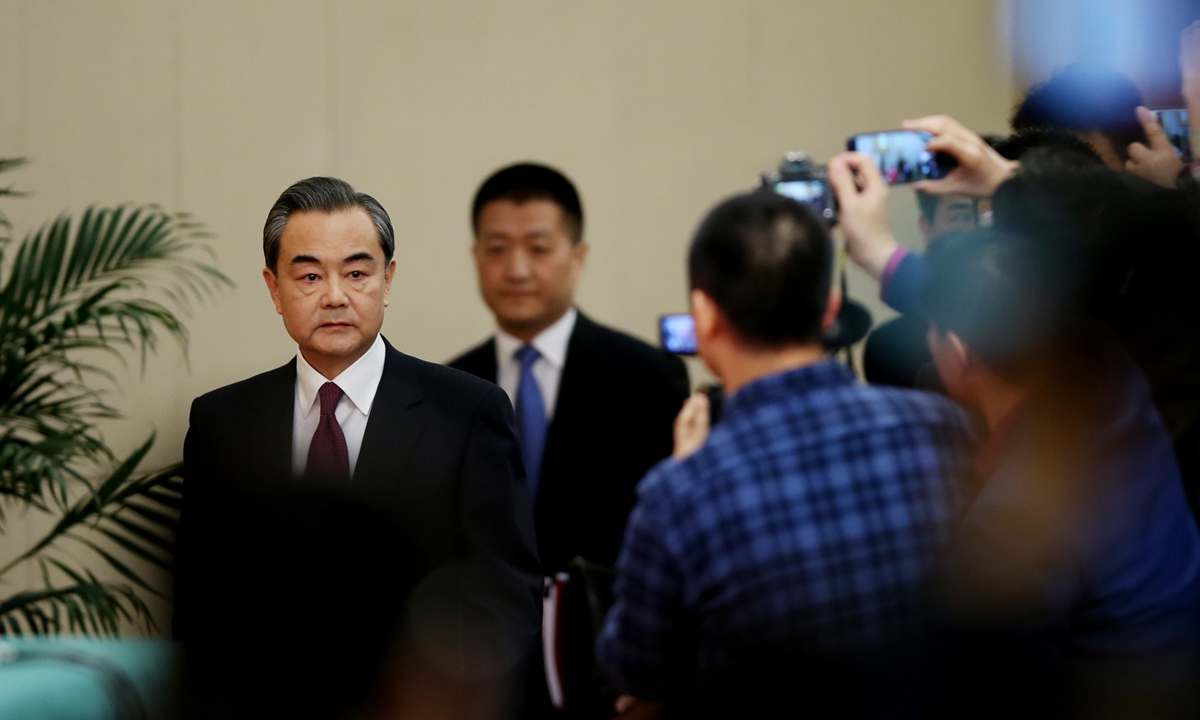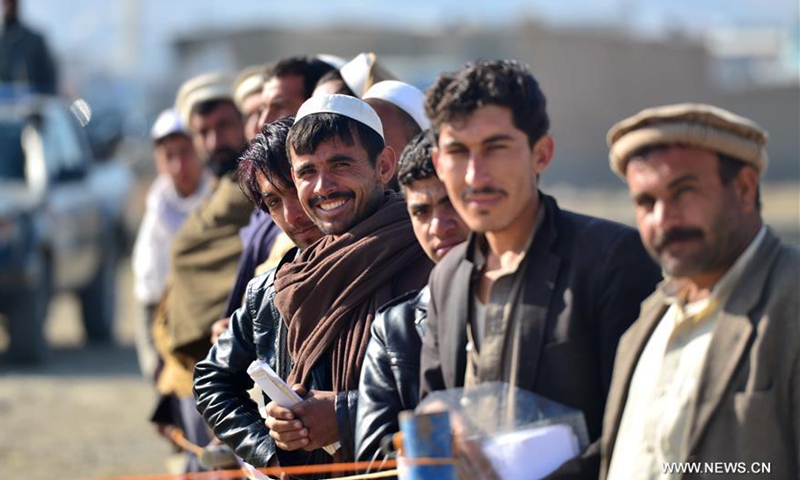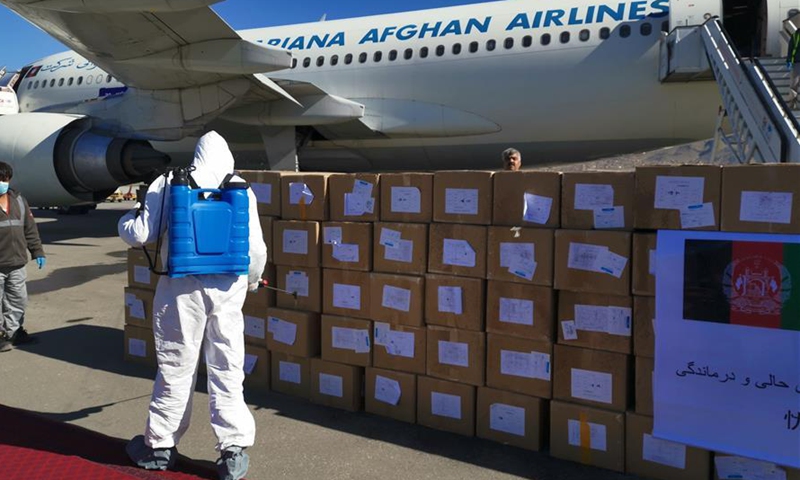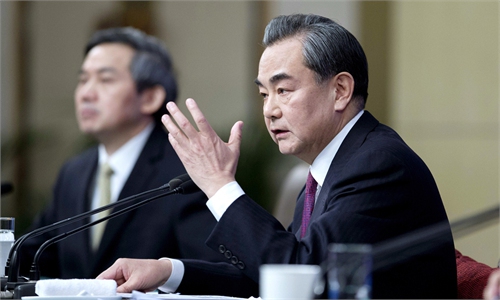
Chinese State Councilor and Foreign Minister Wang Yi File photo: Xinhua
As the security threats of the US military's hasty withdrawal from Afghanistan spills over to neighboring countries, Chinese foreign minister has scheduled visits to three Central Asian countries upon invitation, and will discuss with Shanghai Cooperation Organization (SCO) officials about the situation in Afghanistan.
Despite the shadow cast by Afghanistan's new situation, it propels regional countries, including China, to gaze closely into it. Analysts said there are both challenges and opportunities for China in Afghanistan's situation. By including the Afghanistan issue into the SCO agenda, not only can Beijing help further subdue the chaos left by the power vacuum in this country, but will also push ties between China and other Central Asian countries closer, they noted.
Chinese State Councilor and Foreign Minister Wang Yi will visit Turkmenistan, Tajikistan, and Uzbekistan between July 12 and 16 on the invitation of foreign ministers of the three countries, Chinese Foreign Ministry spokesperson Wang Wenbin announced on Friday.
Wang Yi is also scheduled to attend the meeting of foreign ministers of the SCO-Afghanistan Contact Group, where he will exchange views with other SCO member states and his Afghan counterpart on promoting regional security and stability, advancing the process of peace and reconciliation in Afghanistan, and deepening cooperation between the SCO and Afghanistan, Wang Wenbin said.

Illustration: Chen Xia/GT
The US' "irresponsible and hasty" withdrawal from Afghanistan has given rise to security threats in the country, and instability has begun to spill over to regional states, Qian Feng, director of the research department at the National Strategy Institute at Tsinghua University, told the Global Times.
Under such a circumstance, regional countries are turning to China, hoping it could coordinate a multilateral framework in dealing with the issue, according to Qian.
Led by China and Russia and created in 2001, the SCO also includes India, Pakistan and four other former Soviet republics: Kazakhstan, Kyrgyzstan, Uzbekistan and Tajikistan. It has four observer states - Afghanistan, Mongolia, Belarus and Iran - and six dialogue partners. Six of Afghanistan's neighbors are members of SCO.
What gives the SCO an edge in solving the Afghan issue is its broad mandate, as it addresses the security, economic and human development agenda of Afghanistan, combining support for political stability, implementation of large-scale economic projects and assistance for social capital building, said Sun Zhuangzhi, executive director of Chinese Research Center of SCO.
Sun noted that it can also coordinate efforts of other international actors ranging from the specialized agencies of the United Nations to private foreign companies to small NGOs interested in specific avenues of collaboration with partners in and around Afghanistan.
Qian said that upholding the principle of non-interference, China's role in organizing regional countries to help restore order in Afghanistan fits its image of a responsible power and regional stabilizer. "And during the process of multilateral negotiations, China's relations with other Asian countries will be further enhanced, as such a process requires profound cooperation on various issues, be they economic, counter-terrorism, or other fields."

Afghan people wait to receive allocated aiding materials donated by Chinese government in Kabul, Afghanistan, March 9, 2017. China on Thursday offered 100 million U.S. dollars to assist the Afghan refugees and returnees and further boost bilateral ties with the neighboring country.File photo:Xinhua
Help, not interfere
In an interview with This Week in Asia on Wednesday, Taliban spokesman Suhail Shaheen said the organization sees China as a "friend" to Afghanistan and is hoping to talk to Beijing about investing in reconstruction work "as soon as possible."
"China is a friendly country that we welcome for reconstruction and developing Afghanistan," Suhail said.
This is the recognition for China's active participation in the reconstruction of Afghanistan, and sends a signal to Beijing to further engage in this reconstruction, as development and stability are intertwined, Li Shaoxian, director of China-Arab Research Institute at Ningxia University, told the Global Times.
Yet analysts said that China will cautiously deal with the issue, not jump in the power vacuum left by the US. "We won't interfere, we won't try to navigate the country, we will just provide the help it needs," said Qian.
President Joe Biden on Thursday defended the withdrawal of US troops from Afghanistan as the country appeared increasingly at risk of spiraling into civil war.
He said that the US military mission there will conclude August 31, earlier than initially announced.
When US forces pulled out of Bagram Airfield, a strategic air base in Afghanistan, in the middle of the night last week, they left behind a lot of things, from bottles of water and energy drinks to civilian and armored vehicles, an Afghan general told The Associated Press.
Wang Wenbin criticized the US irresponsibility at the Friday press conference, saying that the US hypocrisy hidden behind "defending human rights and democracy" was fully exposed by its withdrawal. On the contrary, China has always supported the Afghan people to take the country's destiny in its own hands, and is willing to provide support the country needs.
Earlier this month, Wang Yi talked to his counterparts in Afghanistan and Pakistan and said the three countries had agreed to support the "substantial expansion" of investment projects to Afghanistan.
"China proposes expanding the China-Pakistan Economic Corridor (CPEC) to Afghanistan, to help the country further accelerate its peaceful reconstruction, thus reducing the risk of turmoil," Qian said.
The expert also pointed out that the Belt and Road Initiative could bring opportunities to Afghan reconstruction.

Afghan health workers disinfect medical supplies donated by China ahead of a handover ceremony in Kabul, Afghansitan, April 2, 2020.File photo:Xinhua
The Chinese government has evacuated 210 Chinese nationals from Afghanistan on a charter flight to Wuhan amid a deteriorating security situation in Afghanistan. The evacuation mission was widely hailed by Chinese netizens, the Global Times learned.
"This is an emergency response from China seeing that the situation in Afghanistan has rapidly escalated. Further measures for Chinese nationals depend on if the country will slide into civil war again. So that's what China and other regional countries have to keep an eye on. A chaotic Afghanistan will deal a heavy blow to neighboring countries, as well as foreign investments in Afghanistan," said Sun.



